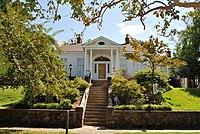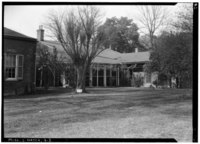The Manse (Natchez, Mississippi)
Manse, The | |
 | |
| Location | 307 S. Rankin St., Natchez, Mississippi |
|---|---|
| Coordinates | 31°33′20″N 91°24′9″W / 31.55556°N 91.40250°W |
| Area | less than one acre |
| Built | 1838 |
| Architectural style | Greek Revival |
| NRHP reference No. | 79001291[1] |
| Added to NRHP | March 7, 1979 |
The Manse, also known as Presbyterian Manse, is a historic house within the Natchez On-Top-of-the-Hill Historic District in Natchez, Mississippi. It has been listed on the National Register of Historic Places since March 7, 1979;[2] and is listed as a pivotal property in the Natchez On-Top-of-the-Hill Historic District.[3]
Location
[edit]The site is located at 307 South Rankin Street in Natchez, Mississippi, USA.[4][5] It is next door to the antebellum house named Green Leaves.
History
[edit]Margaret Overaker is first known to have owned the property.[6] It was purchased in 1832 for $3,500 by Thomas Macdannold—a rich man about whom not much is known.[6] Macdannold must have had the house built, because the property was purchased just four years later in 1836 for a much higher price ($14,320.88) by Thomas Henderson—a First Presbyterian Church of Natchez elder.[6] The property was purchased in 1838 by the First Presbyterian Church of Natchez to serve as its manse.[7] The previous Presbyterian manse was the Natchez home known as the Elms.[8] The following is a list of some of the Presbyterian pastors who lived in the manse.
- 1823: Reverend George Potts[9]
- 1843–1894: Reverend Doctor Joseph Buck Stratton.[6] The two side wings and the pastor's study building in the side yard were built during this time at the manse.[6]
- 1950–1954: Reverend Doctor James Walton Stewart.[10] Church membership increased from 657 to 754 during Rev. Dr. Stewart's tenure in the manse.[10]
Architecture
[edit]As built in the 1830s for Thomas Macdannold, the home was designed in the Federal architectural style.[6] The home has the fine detailing found in the largest two-story Natchez area mansions, and its front door is among the best in the area.[4][6]
When entering from the front door, one stepped into a 9-foot-wide by an 18.5-foot-long hallway with a 17 by 18.5 foot room on each side.[6] Each of these side rooms had a fireplace.[6] At the rear of the front hallway, folding double doors led into a 15 foot wide by 23 foot long back portion of the hallway.[6] This space had an approximately same sized room (14 by 23) on each side of it.[6] Each of these three back rooms had a window, fireplace and a door to the back.[6] A porch ran along the back side of the house.[6] A service wing connected to one end of the rear porch and contained a row of rooms stretching away from the home toward the back of the property.[6] These rooms consisted of a storage room, kitchen, laundry room and enslaved African servants quarters.[6]
In 1847 two smaller wings were added to opposite ends of the house.[6] At this point the home had seven rooms with fireplaces in the main portion and a servant's wing off the back of the house.[6] In 1849 a small separate building was added to the property that was used as Reverend Doctor Joseph Buck Stratton's study.[4] The study was designed in the Greek Revival architectural style.[5]
In 1895 the dining room, which was then located at the rear corner of the main block of the house nearest to the service wing, was divided into three service rooms.[6] These service rooms were a bathroom, a pantry and a hall/trunk room. The rear portion of the center hall became the new dining room.[6] In 1947–48 the rear porch was enclosed.[6] Despite the need to fit in interior bathrooms and a kitchen over the years, the original design has remained largely intact.[6]
-
The Manse
-
Rear view of the Manse in Natchez at 307 South Rankin Street, Natchez, MS
References
[edit]- ^ "National Register Information System". National Register of Historic Places. National Park Service. July 9, 2010.
- ^ "The Manse". National Park Service. Retrieved June 21, 2016.
- ^ Mary Warren Miller (May 31, 1979). "National Register of Historic Places Inventory/Nomination: Natchez On-Top-of-the-Hill Historic District". National Park Service. and accompanying photos
- ^ a b c Kempe, Helen. The Pelican Guide to Old Homes of Mississippi: Natchez and the South. Pelican Publishing. p. 63. ISBN 1455610275.
- ^ a b "National Register of Historic Places Inventory--Nomination Form: The Manse". National Park Service. Retrieved June 21, 2016.
- ^ a b c d e f g h i j k l m n o p q r s t u "National Register of Historic Places Inventory - Nomination Form: The Manse" (PDF). Mississippi Department of Archives and History. Retrieved 17 June 2020.
- ^ Natchez National Historical Park, General Management Plan (GMP) and Development Concept Plan: Environmental Impact Statement. United States. National Park Service. 1994. p. 201.
- ^ Carpenter, Ester. "History and Biography". The Elms. Retrieved 21 June 2020.
- ^ Chisolm, J. Julian (1972). History of the First Presbyterian Church of Natchez, Mississippi. Natchez, MS: McDonald's Printers & Publishers. p. 23. OCLC 661804. Retrieved 18 June 2020.
- ^ a b Chisolm, J. Julian (1972). History of the First Presbyterian Church of Natchez, Mississippi. Natchez, MS: McDonald's Printers & Publishers. p. 122. OCLC 661804. Retrieved 18 June 2020.
External links
[edit] Media related to The Manse (Natchez, Mississippi) at Wikimedia Commons
Media related to The Manse (Natchez, Mississippi) at Wikimedia Commons




